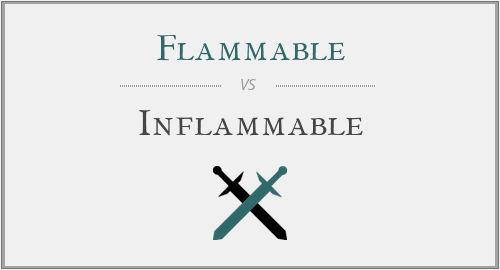Flammable vs. Inflammable: Navigating Fire Safety Terminology
When it comes to fire safety, the terms "flammable" and "inflammable" are used to convey the same concept, but their subtle difference in meaning can lead to confusion. This article aims to clarify the distinctions between "flammable" and "inflammable," shedding light on their meanings, applications, and appropriate usage in various contexts.
Correct Usage:
Flammable:
"Flammable" is the more commonly used term to describe materials that are easily ignited and capable of burning. It is used to denote substances, objects, or environments that pose a fire hazard. The prefix "flam-" indicates a propensity to catch fire easily.
Inflammable:
"Inflammable" is an older term that also denotes materials that are easily ignited and capable of burning. Despite the apparent similarity to "non-flammable," it does not mean "non-combustible" as one might expect. The prefix "in-" in this context means "into" or "thoroughly," and it is used to indicate the material's susceptibility to combustion.
Meanings and Applications:
Flammable:
Use "flammable" to convey the potential of a substance or material to catch fire easily. It is widely recognized in safety standards, warning labels, and regulations related to fire safety.
Inflammable:
While "inflammable" means the same as "flammable," it is considered somewhat archaic. It is still found on some older warning labels and materials, but its use is diminishing to avoid confusion due to the potential misinterpretation of the prefix "in-."

Examples:
Correct: The gasoline is highly flammable; handle with care.
Less Preferred: The gasoline is inflammable; handle with care.
Precautions:
Prefer the use of "flammable" to avoid potential confusion. If "inflammable" is encountered, understand it carries the same meaning but is considered somewhat outdated.
Conclusion:
Understanding the distinction between "flammable" and "inflammable" is crucial for effective communication in the realm of fire safety. While both terms convey the same idea, the use of "flammable" is recommended for clarity and to align with modern safety standards and language conventions.




Have a discussion about this article with the community:
Report Comment
We're doing our best to make sure our content is useful, accurate and safe.
If by any chance you spot an inappropriate comment while navigating through our website please use this form to let us know, and we'll take care of it shortly.
Attachment
You need to be logged in to favorite.
Log In